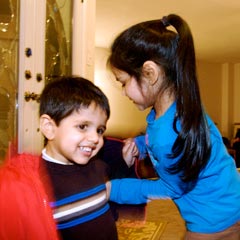But Catholic parents like Liz and Steve Rebello see their role as more than ensuring their kids’ success at school and the workplace. They see their primary role as teaching children about faith and how it can be lived out each day.
Psychologist Elizabeth Ring-Cassidy explains parenting comes down to three general styles: the authoritative, authoritarian and permissive styles. Although there isn’t a well-defined “Catholic style” of raising children because each child and family situation is unique, the authoritative style is “consistent with Catholic values and is considered to be most effective in a more well-rounded individual,” she said.
The authoritarian style is the “old-fashioned direction of ‘my way or the highway,’ ” which echoes Chua’s “Tiger Mom” thesis, while permissive parenting is when kids have no boundaries.
Ring-Cassidy, who teaches developmental psychology at Our Lady Seat of Wisdom Academy in Barry’s Bay, Ont., cautions against Chua’s “cookie-cutter approach” to parenting which values success in terms of achievements.
“We help children be a success within the culture or context of the faith,” said Ring-Cassidy.
Teaching children about faith and encouraging them to use their God-given gifts to the best of their ability are more consistent with a Catholic understanding of success, she said. A 1981 letter on the role of the Christian family in the modern world by the late Pope John Paul II explained that Christian parents’ mission is to educate their children in the faith.
While each family situation is unique, there are some commonalities to a Catholic approach to parenting. For instance, some families put a priority on core Catholic teachings: explaining why the family attends Sunday Mass together, the importance of responsibility and putting faith into action.
Another common trait: start early. In the Rebello household, where the children range in age from six months to 13, all but the youngest have assigned chores and are responsible for a younger sibling, especially on family outings or during meal time.
“No one thinks anything is beneath them. Everyone has a job to do like dishes, clear off the table” and take out the garbage, said Rebello, adding that they try to maintain order in the home every day and don’t leave it until the weekend for things to pile up.
Having chores teaches kids about virtues like responsibility, order and sacrifice, she said. The lesson of responsibility also means giving them a choice and teaches the benefits and consequences of their choice.
“It’s important for them to learn to make choices. As they get older, you won’t be there for them to make the choices for them,” Rebello said.
Karen Hanlon, a mother of three teenage boys and a 12-year-old girl, shares the Rebellos’ philosophy. Chores are a “necessary good for the family. They teach children that they’re an important part of the family,” she said from Barry’s Bay.
And Mass is extremely important.
“We’ve gone to daily Mass ever since the children were babies,” Hanlon said. “For them, that’s a part of our life.”
To ensure that parents’ lessons stick, Ring-Cassidy, a mother of seven, said it’s important to model value or virtue. Children who get their parents’ message “are not just doing church. They’re also doing social justice.”
{iarelatednews articleid="5092"}


 Mississauga. ont. - It’s become a daily morning routine for five-year-old Theresa Rebello. The third youngest of 10 children, Theresa helps her two-year-old brother Luke get ready to go to Mass with her mom and the younger kids while her older siblings head off to school with dad.
Mississauga. ont. - It’s become a daily morning routine for five-year-old Theresa Rebello. The third youngest of 10 children, Theresa helps her two-year-old brother Luke get ready to go to Mass with her mom and the younger kids while her older siblings head off to school with dad.